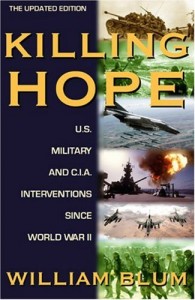Blum, William (Common Courage Press, updated edition October 2008, ISBN 978-1567512526)
In 2009, President Barack Obama won the Nobel Peace Prize “for his extraordinary efforts to strengthen international diplomacy and cooperation between peoples.” [1]
Many thought the prize undeserved – on the grounds that Obama appeared too much the enemy of peace. Had he won it, they asked, for prosecuting a war in Afghanistan? Or instead for his proposal to expand the United States military? Or for his plan to send “at least” two additional American combat brigades to Afghanistan?
I disagreed. On the contrary, I thought the prize undeserved on the grounds that Obama appeared too little the enemy of peace.
As a laureate of the Nobel Peace Prize, Obama joined such paragons of nonviolence as Yasser Arafat and Henry Kissinger. He joined peacemakers such as Menachem Begin, Le Duc Tho and Teddy Roosevelt [2]. He joined peaceful idealists of such embracing compassion as Cordell Hull and Woodrow Wilson; and men such as Anwar Sadat, whose lifelong commitment to peace still enchants the Sinai Peninsula.
Throughout the 1960s, 70s and 80s, Yasser Arafat carried out attacks against civilians in Palestine, Israel, Lebanon, Sudan, Syria and Jordan [3]. In 1978, after hijacking a bus outside Haifa, Arafat’s Fatah showered passing cars and buses with bullets, killing thirty-seven civilians [4]. In 1973, Arafat approved an attack on the Saudi Arabian embassy in Khartoum (which killed three western diplomats and seven others) [5]. In 1972 (with Arafat’s knowledge), a subgroup of Fatah kidnapped and killed eleven Israeli athletes at the Munich Olympics [6].
As Henry Kissinger received his Nobel Peace Prize in 1973, the covert carpet-bombing campaign he’d instituted in Cambodia entered its fourth year. It’d dropped one hundred million kilograms of bombs, rendered two million Cambodians homeless and killed hundreds of thousands of civilians [7].
At the time, Obama didn’t even make it into these guys’ league.
Moreover, Obama had done nothing meaningful to expand America’s peacetime artillery.
In parallel with the military and clandestine bombings against her enemies, since the 60s America has sustained an unrelenting campaign of peacetime bombing against her allies. Each week, using ordinary civilian aircraft, the USA drops almost four hundred thousand tourists on allied nations. In Europe alone, more than half a million Americans in baseball caps throng the streets looking for a McDonalds. Preferring their own company, they unite as an idiotry-in-arms of Coca-Cola-drinking ignoramuses who talk only about buying things and make no effort to adapt to their surroundings. Educated by talk shows and blind to their nation’s bellicosity, they choke the hotels and tour busses treating a culture like an amusement park of rides and gift shops.
Unlike the “good and evil” demagoguery of his predecessor, Obama’s willingness to acknowledge some of his country’s mistakes did nothing to enhance the obnoxiousness or potency of America’s peacetime artillery. Worse, by calling for a refundable tax credit for education and an extra eighteen billion dollars a year for public schools, Obama had even started to dismantle it.
Obama’s acts appeared warlike only by human standards. By the standard of statesman laureates of the Peace Prize, they appeared like minnows amidst a school of whales. He didn’t deserve the Nobel Peace Prize.
Footnotes:
[1]
- “The Nobel Peace Prize 2009”. Nobel Foundation. Retrieved 2015.
[2]
- As Vidal puts it, “One must never underestimate the Scandinavian wit”. Vidal, Gore, The American Presidency (Odonian Press, July 2002, ISBN 978-1878825155)
[3] For general information about Yasser Arafat, see for instance,
- Sayigh, Yezid, Armed Struggle And The Search For State: The Palestinian National Movement 1949-1993 (Oxford University Press, 1997);
- Aburish, Said, From Defender To Dictator (Bloomsbury Publishing, 1998);
- Yasser Arafat (Wikipedia);
- Hockstader, Lee, “A Dreamer Who Forced His Cause Onto World Stage: Goal of Palestinian State Proved Elusive” Washington Post November 11, 2004
[4]
- “Statement To The Press By Prime Minister Begin On The Massacre Of Israelis On The Haifa – Tel Aviv Road” – 12 March 1978;
- “4]
[5]
- Klein, Aaron, Striking Back (Random House, 2005)
[6]
[7]
- Blum, William, Killing Hope: U.S. Military And C.I.A. Interventions Since World War II (Common Courage Press, updated edition 2008)


